A Model of Participatory Management of Community Learning Resources to Promote Agricultural Occupations Based on The Philosophy of Sufficiency Economy
Keywords:
Learning Resource Management, Participatory Learning, Opportunity Expansion School, Sufficiency EconomyAbstract
The objectives of this research were to 1) Study the condition of participatory management of community learning resources to promote agricultural occupations based on the philosophy of sufficiency economy. 2) Create and develop a model of participatory management of community learning resources to promote agricultural occupations based on the philosophy of a sufficiency economy. And 3) Evaluate the use of a model of participatory management of community learning resources to promote agricultural occupations based on the philosophy of sufficiency economy. The populations and sample groups were 672 peoples of administrators, teachers, students, committees, parents, community leaders, and village philosophers of the School of Educational Opportunity. Under the Office of Roi-Et Primary Education Area 2.
The research results showed that : (1)The condition of participatory management of community learning resources to promote agricultural occupations, the overall practice was 90.27%. When considering each aspect, it was found that the management of learning resources was 88.19%, the use of learning resources was 89.31%, and the field of supervision and follow-up, the practice was 94.17% (2) A model of participatory management of community learning resources to promote agricultural occupations based on the philosophy of sufficiency economy consisting of 1) policy analysis 2) planning 3) implementation 4) activities and 5) follow-up supervision. and (3) The feasibility and appropriateness of A model of participatory management of community learning resources to promote agricultural occupations based on the philosophy of sufficiency economy, Overall was at the highest level.
References
Baiyam, P. et al. (2015). Development of an appropriate model for using local learning resources. to manage education at the elementary level. Information journal. 14(1), 23-34.
Chansri, C. (2012). The Development of a Management Model for Learning Management According to Philosophy. of sufficiency economy in school Under the Maha Sarakham Educational Service Area Office, Region 3. Maha Sarakham : Maha Sarakham Rajabhat University.
Ministry of Education. (2005). Learning and teaching management that emphasizes student-centeredness. (Self-learning series No. 8, One District Project one dream school). Bangkok: Ministry of Education.
Namuang Rak, S. (2012). Effectiveness of the Sufficiency Economy Project for Community Development in Bueng Kum District. Bangkok. Pathum Thani : Valaya Alongkorn Rajabhat University under the royal patronage
Non Sawang Subdistrict Administrative Organization. (2015). 3-year manpower plan (2015-2017) Non Sawang Subdistrict Administrative Organization. Roi Et : Non Sawang Subdistrict Administrative Organization.
Office of the National Economic and Social Development Board. (2007). Sufficiency Economy Philosophy. Bangkok: 21st Century.
Office of the Permanent Secretary, Ministry of Education. (2015). Policy of the Minister of Education (Gen. Dapong Ratanasuwan). Bangkok: Office of the Permanent Secretary. Ministry of Education.
Downloads
Published
How to Cite
Issue
Section
License
Copyright (c) 2023 เทพฤทธิ์ เทพวิริยพงศ์, ณัฏฐชัย จันทชุม, ชยากานต์ เรืองสุวรรณ

This work is licensed under a Creative Commons Attribution-NonCommercial-NoDerivatives 4.0 International License.
Articles that are published are copyrighted by the authors of the articles







